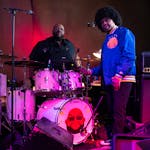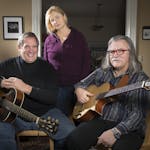Robbie Robertson is one of rock's great storytellers.
Whether recounting in song about "The Night They Drove Old Dixie Down" or on film about being a "Carny," Robertson manifests a flair for crafting characters, detail and drama.
Since his last waltz with the Band in 1976, Robertson has recorded a handful of disparate solo albums, produced records for others and scored several Martin Scorsese movies, most recently "The Irishman." He stars in a new documentary, "Once Were Brothers" — opening Friday at the Lagoon Cinema in Minneapolis — based on his 2016 memoir, "Testimony."
Robertson's fascination with film goes way back.
"At a very young age, I went to movies and went into another world and it felt good to me. I lived inside those stories," he said recently from Los Angeles. "If I hadn't gotten so addicted to music, I feel like I would have been a [screen]writer or a director."
The Rock Hall of Famer was so enamored of movies that he once sent music to director Ingmar Bergman, unsolicited. "He sent a thing back, saying, 'I work with my little community of actors and cinematographers and musicians. … Because there is a such a difference in our cultures, I don't know if we'll ever be able to find a way to do that.' "
In a wide-ranging interview, Robertson, 76, talked about his new documentary as well as his relationship with Bob Dylan, who used the Band as his backup group on his first electric tour in 1965 and on his 1974 comeback tour.
Q: Why did you make this movie?
A: Some documentary film companies said there should be a documentary based on my book. They recommended some filmmakers and I wasn't feeling the connection. Then I met with this young guy [Daniel Roher] who had done some documentaries. I got a gut feeling: I want to take a shot with this guy, 24 years old. I was 24 when I made "Music From Big Pink" [the Band's 1968 debut].
Q: What did you think of Levon Helm's 1993 memoir, "This Wheel's on Fire"?
A: I never did get around to it. Some mutual friends of ours said, "At some points in there, he ragged on you." I knew that Levon was having a tough time. He was always somebody who never thought it was anything to do with him. I loved him. I chose to just not be responsive and hope he was OK. I was glad in the documentary that we were able to say in a certain way how much he meant to me.
Q: After "The Last Waltz," did you want the Band to break up or clean up from all the drugs and drink?
A: There was no breakup. That was never in the discussion ever. It had evolved to where there were these characters that came around that made me feel that something bad is going to happen. Somebody's going to die. I thought we've got to go back underground and figure out a way to take care of one another and then do some great work. That was my vision, my yearning for this. I knew this couldn't go on the way it was.
Q: How were you as a Canadian able to tap into Americana sounds and stories?
A: I think because I went down to the Mississippi Delta when I was 16 years old [backing rockabilly singer Ronnie Hawkins]. It had such a profound effect on me. I thought this is where all the music I love grows out of the ground. That music just seeped out over time. It became part of my storytelling ammunition. I stored so much stuff. One night you're going to see Howlin' Wolf play in a club. Then we'd go down the road and Carl Perkins would be playing. It was all there.
Q: What kind of impact did the Band have on Dylan, and Dylan on the Band?
A: We knew very little about folk music, the world that was so important to him. We were a rock 'n' roll band. We never played acoustic instruments. We never had any. The meeting of these worlds was an interesting challenge for both of us. It seemed to me: You mix these things together and it was quite potent, quite dynamic. The fact that it didn't connect in an obvious way with the outside world, if it was OK with Bob, it was OK with me. That helped the music just be bolder and more aggressive.
Q: What did it feel like being booed every night on that pivotal 1965 tour?
A: I don't know if there's ever been anything like this for anybody with this caliber of success. I thought about it at the time: People don't go through this. We go out every night and people boo us and we go on to the next place. Then it sunk in that we were actually part of a musical revolution. We were young enough that that felt really good.
Q: You were one of the very few people at Dylan's wedding to Sara Lownds in 1965. What was it like?
A: It was an under-the-radar experience. It was cool. I loved these people. I was very happy just to be there for them.
Q: How did you get Dylan to be interviewed for this movie?
A: I know he never does this stuff. We just have a background together. He called me awhile back and he said, "They wanted to use me and some of our early stuff in the film, so they need me to look at it to sign off on it. I don't really like these kind of documentaries for the most part. I started watching this and I got completely taken in. I thought it was fantastic."
Q: Do you consider Dylan part of the brotherhood?
A: Oh, absolutely. Blood brothers.
Twitter: @JonBream • 612-673-1719





